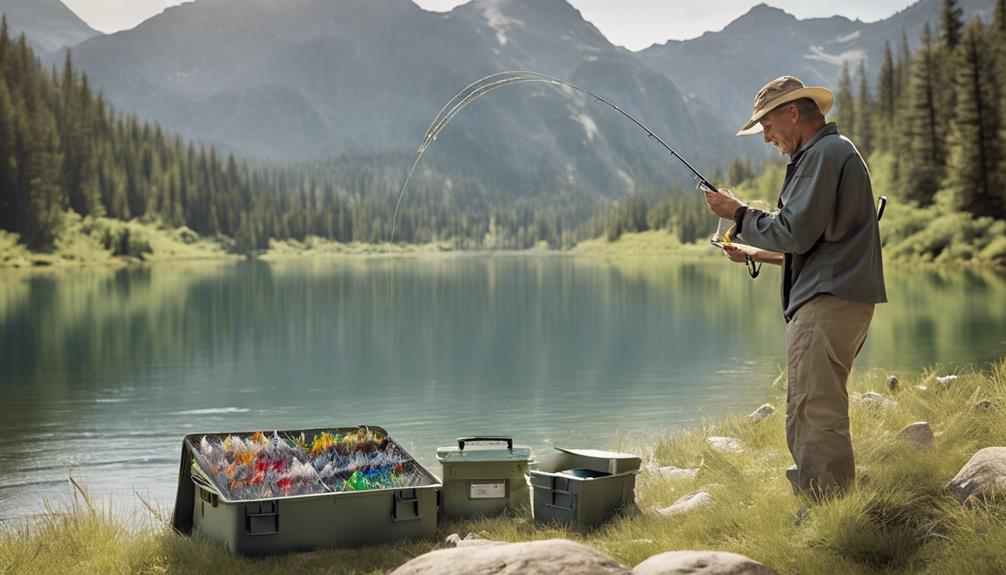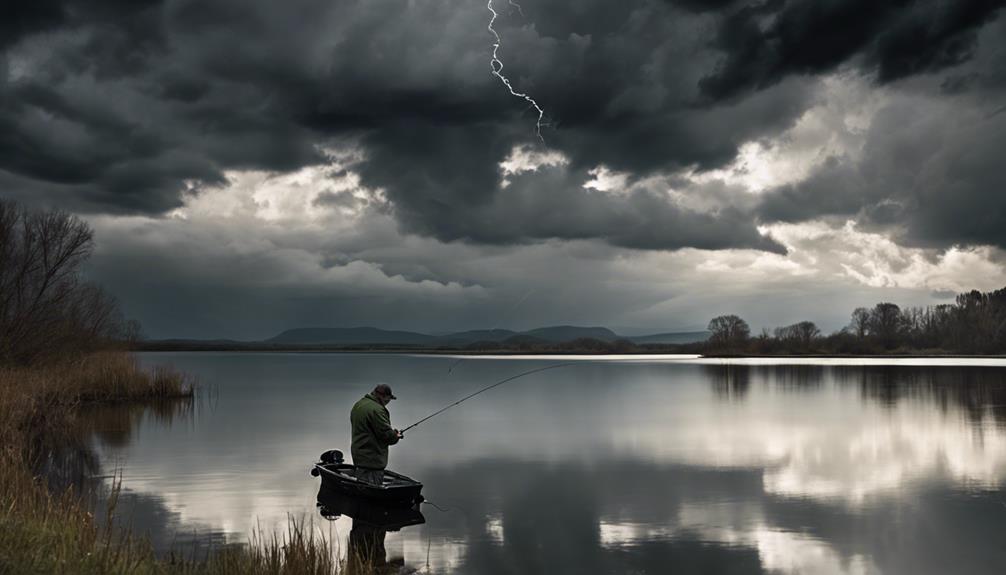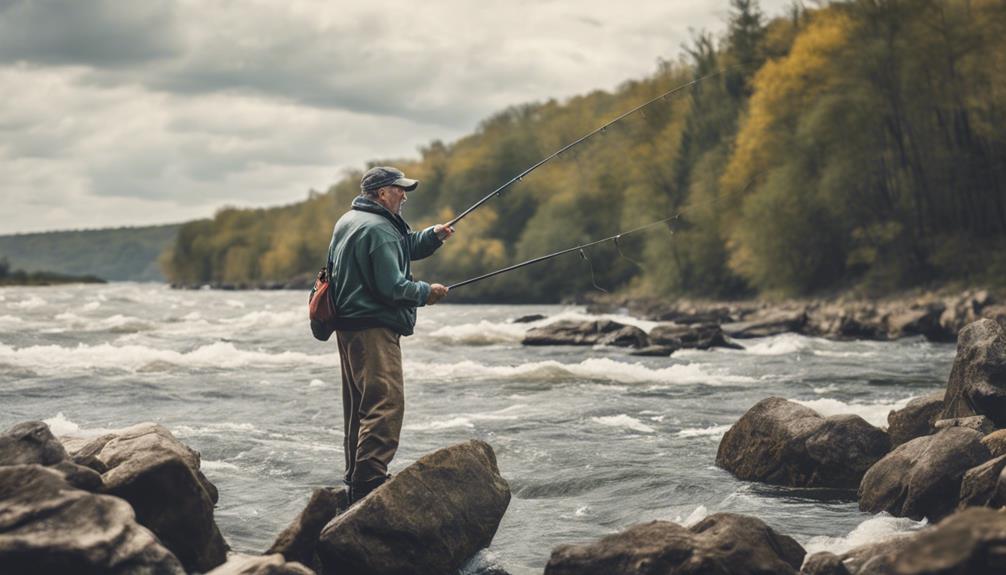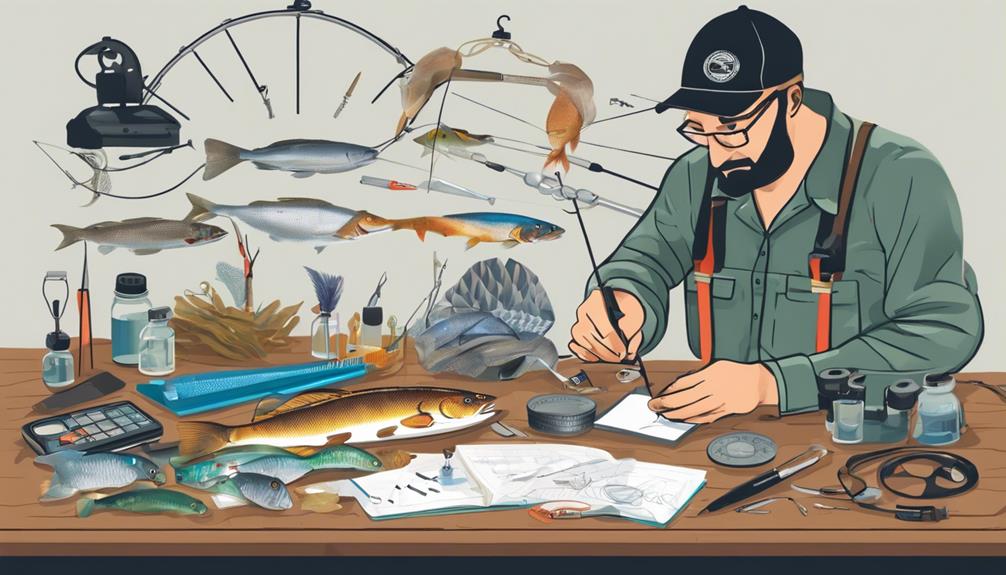Imagine you're out on the water, casting your line in anticipation of a big catch. Suddenly, you feel a tug on your line, and the fight is on. As you reel in your prize, the thrill of the catch is undeniable.
But did you know that there are ways to enjoy competitive angling while also protecting the environment for future generations? By following the 7 best practices for environmentally friendly angling, you can ensure that your love for the sport aligns with conservation efforts.
Proper Disposal of Fishing Line
When wrapping up your day of fishing, remember to always properly dispose of your fishing line to protect the environment and wildlife. Improperly discarded fishing line poses a significant threat to marine life, contributing to plastic pollution and endangering various species. One effective way to ensure responsible disposal is by participating in recycling programs and line collection initiatives. These programs facilitate the proper recycling of fishing lines, preventing them from ending up in oceans and harming marine ecosystems.
Marine conservation efforts heavily rely on the responsible disposal of fishing gear like lines. By participating in line collection programs, you actively contribute to safeguarding marine life and habitats from the dangers of plastic pollution. Properly disposing of fishing line not only benefits the environment but also ensures a more sustainable future for angling activities.
Recycling programs specifically designed for fishing gear help in reducing the negative impacts of abandoned or lost fishing lines. These initiatives promote environmental awareness among anglers and emphasize the importance of maintaining clean waters for both present and future generations. By engaging in line recycling programs, you play a crucial role in preserving the delicate balance of marine ecosystems, making a tangible difference in the fight against plastic pollution. Remember, every small action counts towards a healthier environment for all.
Selecting Eco-Friendly Baits
To ensure environmentally friendly angling practices, consider selecting eco-friendly baits for your fishing excursions. When choosing baits, opt for options that are sustainably sourced to minimize the impact on marine ecosystems. Look for baits made from renewable resources or those that are harvested in ways that don't harm marine populations.
Sustainable sourcing is crucial in preserving fish populations and maintaining the balance of aquatic environments. Avoid baits that are linked to overfishing or destructive fishing practices. Instead, explore alternative options such as artificial baits made from biodegradable materials or natural baits that are abundant in the local environment.
By selecting eco-friendly baits, you can contribute to the conservation of marine life while still enjoying your angling experience. Consider using lures made from recycled materials or those that can be reused multiple times to reduce waste. Additionally, support companies that prioritize sustainability in their bait production processes.
Remember that every choice you make as an angler has an impact on the environment. By opting for eco-friendly baits, you can help protect aquatic ecosystems and promote responsible fishing practices. Together, we can enjoy the sport of angling while ensuring a sustainable future for marine life.
Catch and Release Techniques
Consider implementing effective catch and release techniques to promote the conservation of fish populations during your angling endeavors. Proper fish handling is crucial when practicing catch and release. Always wet your hands before handling a fish to prevent damaging its protective slime layer. Avoid touching the gills or placing unnecessary pressure on the fish's body. When unhooking the fish, use long-nose pliers to gently remove the hook, minimizing any harm caused. If the fish is deeply hooked, consider cutting the line rather than causing further injury during hook removal.
It is essential to keep the fish in the water as much as possible during the unhooking process. If you need to take a quick photo, support the fish horizontally with both hands and avoid squeezing it tightly. Ensure the fish is revived properly before releasing it back into the water. Hold the fish upright underwater, allowing it to regain its strength before swimming away.
Respect Wildlife Habitats
Respecting wildlife habitats is crucial for preserving the delicate balance of ecosystems and ensuring the continued well-being of the diverse species that inhabit them. Habitat preservation plays a vital role in maintaining the natural environment that sustains various wildlife populations. When engaging in ethical angling practices, it's essential to be mindful of the impact your actions may have on these habitats.
Wildlife conservation is closely linked to responsible fishing practices. By respecting wildlife habitats, you contribute to the protection of critical areas where many species find food, shelter, and breeding grounds. Avoid damaging vegetation, disturbing nesting sites, or leaving behind any waste that could harm the ecosystem. Practicing catch and release in a responsible manner also aligns with this principle, as it minimizes the disruption to the natural habitat and allows fish populations to thrive.
As an environmentally conscious angler, you play a significant role in upholding these principles. By integrating habitat preservation and ethical angling into your fishing routine, you not only demonstrate respect for the environment but also set an example for others to follow. Remember, the well-being of wildlife and their habitats depends on the responsible actions of anglers like you.
Use Biodegradable Gear
When selecting your fishing gear, opt for biodegradable options to minimize environmental impact. Using eco-conscious tackle is a sustainable practice that can help protect aquatic ecosystems and wildlife. Traditional fishing gear, such as plastic lures and nylon lines, can take hundreds of years to decompose, posing a threat to marine life and water quality. By choosing biodegradable alternatives, like lures made from natural materials or lines that break down more quickly, you can reduce the amount of harmful waste in our waters.
Eco-conscious tackle options are becoming more readily available as the fishing industry embraces sustainable practices. Biodegradable fishing lines, made from materials like hemp or biodegradable plastics, offer the same strength and durability as traditional lines while being kinder to the environment. Similarly, biodegradable lures, such as those made from wood or natural fibers, are effective at attracting fish without leaving behind harmful residues.
When you prioritize using biodegradable gear, you contribute to the conservation of aquatic habitats and the preservation of marine life. By adopting sustainable practices in your angling activities, you can enjoy the sport while minimizing your ecological footprint. Make a positive impact by choosing biodegradable options for your fishing gear and promoting responsible angling practices for a healthier environment.
Minimize Noise Pollution
To further reduce your impact on the environment while angling, ensuring you minimize noise pollution is crucial for maintaining the natural balance of aquatic ecosystems. A silent approach is key; disturbing the peace of the water can disrupt the behavior of fish and other wildlife, impacting their feeding and breeding patterns. When moving around your fishing spot, tread lightly and avoid unnecessary noise.
Quiet equipment plays a significant role in reducing noise pollution. Opt for fishing gear that operates silently, such as reels with smooth drag systems that don't create loud clicking sounds. Electric trolling motors are quieter than traditional gasoline-powered ones, minimizing disturbances in the water. Additionally, choose lures and baits that can be used without excessive noise, allowing you to attract fish without scaring them away.
Consider the noise you produce while on the water. Keep conversations at a low volume and avoid slamming hatches or compartments on your boat. Be mindful of the sounds you make when handling equipment, as even small disturbances can have a cumulative effect on the underwater environment. By adopting a quieter approach and using silent equipment, you can enjoy angling while respecting the serenity of the aquatic ecosystems you rely on.
Participate in Clean-Up Efforts
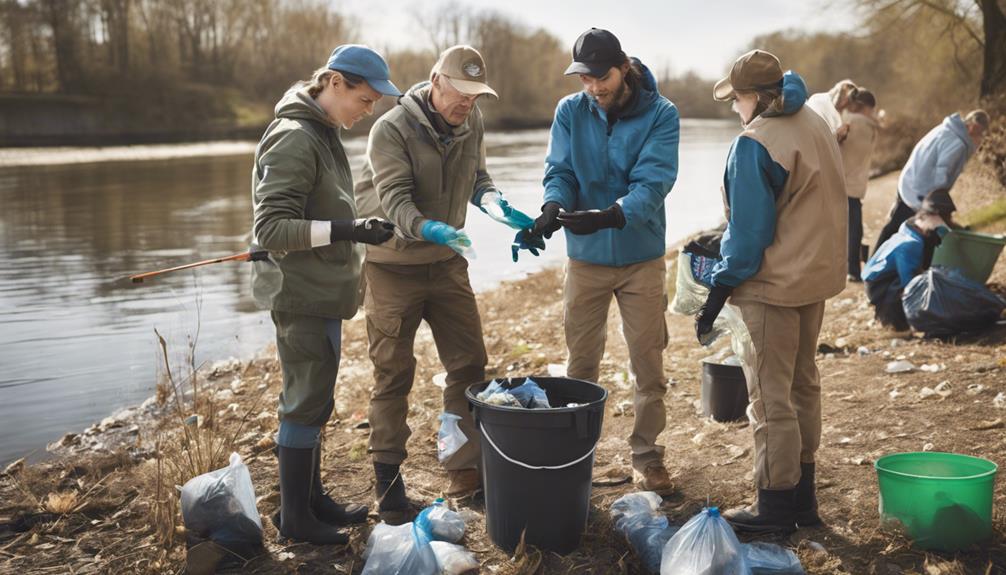
Engage actively in clean-up initiatives to safeguard the cleanliness of angling environments and preserve the natural beauty of aquatic habitats. By participating in these efforts, you contribute to the sustainability and well-being of the ecosystems where you enjoy your sport.
Here are some key ways you can get involved:
- Beach Cleanups: Join organized beach cleanups in your area or initiate one yourself. Removing debris and trash from shorelines not only benefits marine life but also enhances the overall experience for anglers and beachgoers alike.
- Community Involvement: Collaborate with local organizations, fishing clubs, or environmental groups to coordinate clean-up events. By working together, you can make a more significant impact and raise awareness about the importance of keeping angling environments clean.
- Waterway Restoration: Support initiatives focused on restoring rivers, lakes, and other water bodies. These projects help maintain healthy habitats for aquatic species and improve the overall quality of the fishing experience.
- Habitat Preservation: Take part in efforts to protect and conserve critical habitats such as wetlands, mangroves, and coral reefs. These ecosystems play a vital role in supporting biodiversity and ensuring the long-term sustainability of fish populations.
Educate Fellow Anglers
To promote a culture of environmental stewardship within the angling community, emphasize the importance of educating fellow anglers about sustainable practices and conservation efforts. Conservation awareness and community engagement are key aspects of sustainable fishing and conservation initiatives. By sharing knowledge and best practices with your fellow anglers, you can help create a more environmentally conscious angling community.
Start by leading by example. Show your peers how to properly handle and release fish, use biodegradable fishing gear, and respect fishing regulations. Encourage discussions about sustainable fishing practices and the importance of conservation during angling trips or at fishing events. You can also organize workshops or seminars to educate others about the impact of their actions on the environment and how they can contribute to conservation efforts.
Engage with your fellow anglers in a positive and constructive manner. Instead of criticizing or shaming them for unsustainable practices, approach the conversation with empathy and understanding. Share success stories of conservation initiatives and how they've positively impacted the environment. Encourage collaboration on conservation projects or clean-up efforts to foster a sense of community and shared responsibility for protecting our natural resources.
Frequently Asked Questions
How Can Anglers Contribute to Scientific Research and Conservation Efforts Through Their Angling Practices?
You can make a real difference by participating in citizen science projects while you enjoy your time fishing. Through data collection during your angling trips, you contribute valuable information for scientific research and conservation efforts.
Engage with outreach programs that promote angler involvement in these initiatives. Your actions as an angler can have a significant impact on understanding and protecting the environment.
Are There Any Specific Regulations or Guidelines for Anglers to Follow in Order to Protect Endangered Species While Fishing?
When fishing, it's crucial to follow angling guidelines to protect endangered species and support conservation efforts. Regulations like catch limits and release practices help safeguard vulnerable populations. By respecting these rules, you contribute to species protection and environmental preservation.
Stay informed about local laws and guidelines to ensure you're doing your part in safeguarding endangered species while enjoying your time on the water.
What Steps Can Anglers Take to Reduce Their Carbon Footprint While Traveling to Fishing Locations?
To reduce your carbon footprint while traveling to fishing spots, opt for eco-friendly transportation like carpooling or using public transport.
When choosing gear, go for sustainable options like biodegradable fishing line and lead-free weights.
These small changes can make a big impact on the environment while still enjoying your angling experience.
How Can Anglers Effectively Communicate the Importance of Environmental Stewardship to Younger Generations?
When reaching out to younger generations about environmental stewardship, remember to make it engaging and relatable. Use fun activities and hands-on experiences to show them the importance of conservation.
Encourage them to explore nature and teach them about the impact of their actions on the environment. By fostering a love for the outdoors and wildlife in youth, you're creating future advocates for conservation efforts.
Youth education is key to securing a sustainable future.
Are There Any Emerging Technologies or Innovations in the Fishing Industry That Are Helping to Promote Sustainability and Conservation Efforts?
When it comes to sustainability and conservation efforts in the fishing industry, there are exciting developments. Sustainable gear and eco-friendly practices are becoming more prevalent.
Innovations like biodegradable fishing lines and eco-conscious manufacturing processes are making a positive impact. Embracing these advancements not only benefits the environment but also sets a great example for future generations.
Stay informed and support these initiatives to help preserve our waters for years to come.
Conclusion
By following these best practices, you can enjoy competitive angling while also protecting the environment.
Proper disposal of fishing line, selecting eco-friendly baits, and practicing catch and release techniques are just a few ways to make a positive impact.
Remember to respect wildlife habitats, use biodegradable gear, minimize noise pollution, and participate in clean-up efforts.
Educate fellow anglers on the importance of environmentally friendly practices to ensure the sustainability of our waters for future generations.
